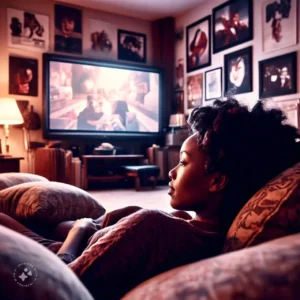Have you ever felt like your dreams were the sequel to the last movies you watched? One moment you’re dozing off peacefully, and the next, you’re running from a villain or falling in love with a fictional character. It’s fascinating how movies and dreams, two forms of storytelling, intertwine to create a vivid, sometimes surreal experience. But why do movies have such a powerful influence on our dreams? Let’s explore the psychology behind this intriguing connection.
How Movies Influence Dreams
Movies are crafted to be immersive experiences. From gripping visuals to heart-pounding soundtracks, they pull us into their worlds. But when the credits roll, your brain doesn’t switch off—it processes everything you’ve just seen, heard, and felt.
Dreams, on the other hand, are shaped by your subconscious mind, often drawing from your recent experiences. According to psychologists, movies—especially those that evoke strong emotions or leave a lasting impression—stimulate the areas of the brain responsible for memory, emotion, and imagination. When you drift into REM sleep, your mind weaves these cinematic elements into your dreams.
The Emotional Connection
Movies that stir up intense emotions, whether fear, joy, or sadness, are more likely to resurface in your dreams.
- Horror Films: A chilling horror movie like The Conjuring can trigger nightmares. The suspense and jump scares activate your fight-or-flight response, which lingers in your subconscious and often replays as stressful dreams.
- Romantic Movies: Heartwarming films like The Notebook might inspire dreams filled with love, nostalgia, or reflections on personal relationships.
- Sci-Fi and Fantasy: Visually stunning films like Inception or Interstellar can inspire surreal, otherworldly dreams, as they challenge your imagination and curiosity about alternate realities.
- Action/Thrillers: High-adrenaline movies like Mission Impossible may lead to fast-paced, adventurous dreams, complete with car chases or complex puzzles.
The Role of Memory and Imagination
Psychologists have identified a phenomenon called the Tetris Effect, where repetitive or impactful visual stimuli influence what people dream about. For example, if you binge-watch a series like Squid Game, your dreams might take on a survival-game twist, replaying scenes or themes from the show.
Movies leave a psychological imprint because they engage both your conscious and subconscious mind. The more vivid and emotionally charged the experience, the more likely your brain is to incorporate it into your dream narrative.
Lucid Dreaming and Creative Minds
If you’ve ever realized you were dreaming and decided to control the plot, you’ve experienced lucid dreaming. People who frequently watch movies or engage in creative activities are often more prone to this phenomenon. Films prime your brain with narrative cues, encouraging your subconscious to build imaginative, story-like dreams where you can play an active role.
Why Some Movies Haunt Your Dreams More Than Others
Not all movies have the same effect on your dreams. Certain factors determine whether a film will stick with you long after the credits roll:
- Emotional Impact: Movies that resonate with personal fears, desires, or memories are more likely to be replayed in your dreams.
- Unresolved Endings: Films with ambiguous or thought-provoking conclusions can leave your brain racing to find answers, which often manifest in dreams.
- Sensory Intensity: Films with striking visuals or suspenseful soundtracks create a stronger imprint on your subconscious.
Can Movies Influence Your Mood Through Dreams?
Absolutely. The emotional tone of your dreams can carry over into your waking life, leaving you feeling happy, anxious, or even unsettled. For instance:
- A feel-good rom-com can leave you waking up with a smile.
- A dark psychological thriller might result in unease or tension throughout your day.
- An inspiring movie could motivate you by sparking creative or positive dreams.
Tips to Control Movie-Inspired Dreams
If you find movies influencing your dreams more than you’d like, here are some ways to manage the effect:
- Be Mindful of Timing
- Avoid watching intense or emotionally charged movies right before bed. Opt for lighter, uplifting films in the evening.
- Create a Wind-Down Routine
- Engage in calming activities like reading, meditation, or listening to soothing music before sleep.
- Process Your Emotions
- Journaling or reflecting on how a movie made you feel can help your brain process it consciously, reducing its influence on your dreams.
- Limit Screen Time
- Give your mind time to unwind by disconnecting from screens an hour before bed.
The Psychology of Dreams and Movies: A Fascinating Intersection
Movies and dreams share a deep psychological connection. Both use storytelling to explore emotions, challenge perceptions, and transport us to different worlds. When movies influence your dreams, it’s a reflection of how powerfully they resonate with your subconscious mind.
Next time you wake up from a cinematic-inspired dream, take a moment to reflect—it might reveal more about your emotions, imagination, and even unresolved thoughts than you realize.


